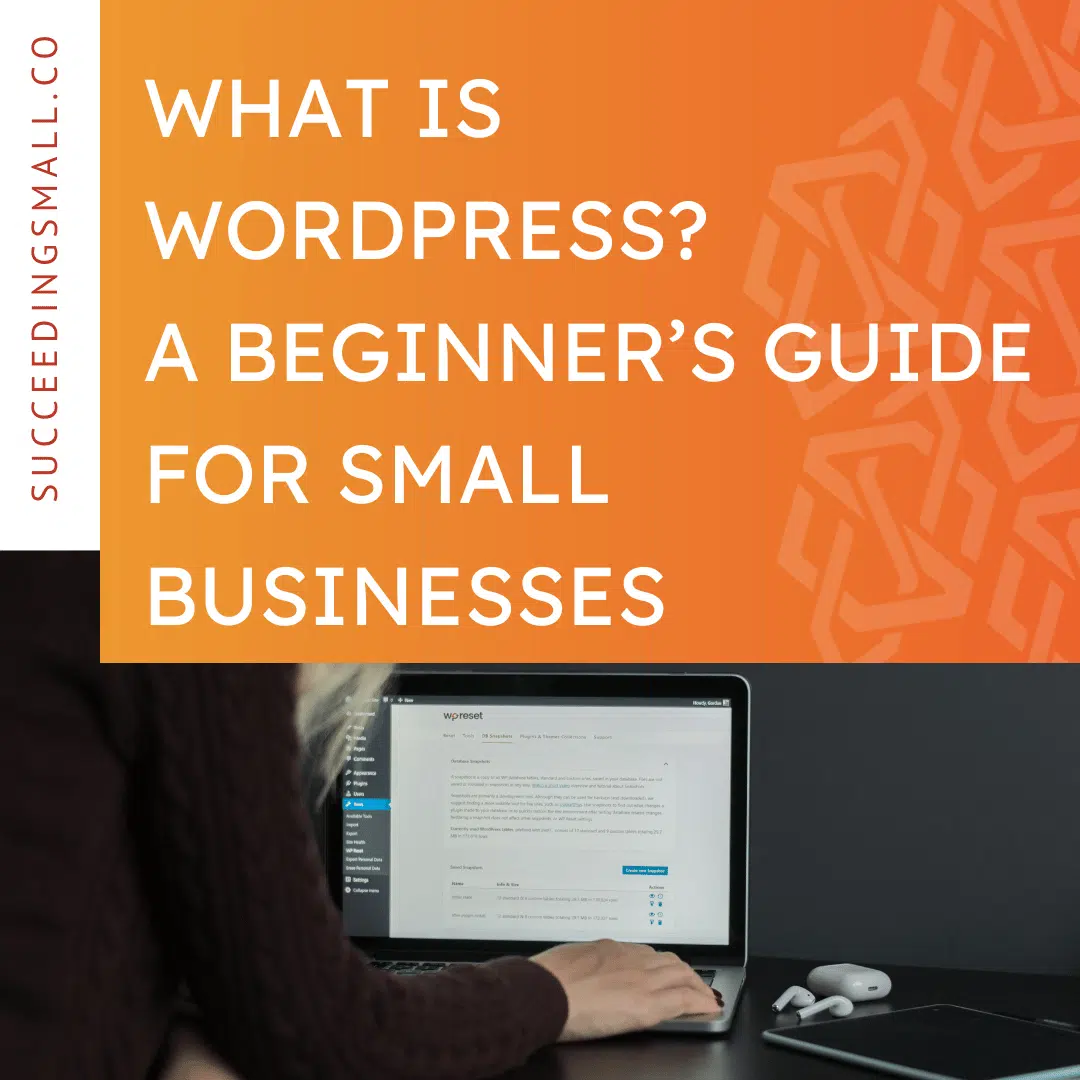SEO is an incredibly broad subject. There are many intricacies of SEO and how the Google algorithm works, along with the latest algorithm update and different hacks to optimize your website or your copy. There is so much to SEO, but we want to give you a quick explanation of what SEO is and what you, as a small business owner, can do to dive right into it.
At Succeeding Small, we’re a digital marketing agency in Colorado Springs specializing in search engine marketing. We help small businesses like yours get found online through thoughtful, strategic SEO — without the overwhelm. Whether you’re brand new to SEO or looking to take your strategy to the next level, we’re here to guide you every step of the way.
Keep reading to learn more!

What is SEO?
SEO, or Search Engine Optimization, is a service that has been defined and interpreted in a variety of ways. However, we will present our carefully crafted and practically applied definition of SEO, which has proven effective in four small-scale businesses operating in local markets.
At Succeeding Small, we define SEO as the process of optimizing digital assets to maximize visibility in as many places as possible. It is often believed that this only involves the process of ranking your website to show on Google’s search engine results page (SERP), but SEO can be applied to any search engine, like Yahoo, or Instagram.
Again, the aim of SEO is visibility. Applying Search engine Optimization principles across social platforms like Facebook and Instagram is just as important to make your business more discoverable to users searching for relevant products or services. By optimizing your social media content with SEO principles, you can increase your chances of being found by potential customers and drive more traffic to your business.
Understanding the Algorithm
To get on the first page of Google, we first have to understand the platforms that we are posting on. This means understanding the algorithm behind Google and how the search engine delivers us results.
When somebody searches online, they type in a keyword phrase like “chiropractor near me,” and then the results are given to them. If we understand the process of how that happens, we are better equipped to create assets that adhere to those high-quality philosophies. So, understanding Google’s algorithm is step number one.
Now, nobody knows Google’s algorithm. Google is very secretive about its algorithm and how it ranks its websites. All we know is that Google updates its algorithm very frequently.
Oftentimes, they will release what they have been doing with that change, but sometimes they do not. That is why individuals have dedicated their entire lives and careers to understanding these algorithms, and with AB testing, they have been able to predict changes of what is going to happen while also coming up with solutions and strategies to accommodate Google’s algorithm.

Keyword Phrases
Search engines start working with somebody typing something into the search engine. These are called Keyword Phrases. That is why SEO experts do Keyword Research.
This is the foundation for every SEO campaign. It starts with understanding what phrases your ideal customers are typing in. There are many research tools for keyword research, Succeeding Small’s favorite tool is Keywords Everywhere.
Keyword Everywhere is a Google extension. Once you purchase the extension along with some credits, you can get access to live data as you type something into Google. This data includes how many monthly searches there are for your keyword phrases and more.
So, if you type in “chiropractor near me,” you can see this keyword phrase has ‘X’ amount of monthly searches. Now that you know this specific keyword phrase has search volume, you can integrate this phrase into your website to be able to optimize your site for that particular keyword phrase.
This is what most people are familiar with when it comes to hearing the word SEO – they often think of keywords. However, algorithms also function off on rank signals.
Now, What is a Rank Signal?
A rank signal is anything a search engine might use to decide where to rank a website on its search engine results page. There are supposedly over 200 rank signals that Google uses to decide whether or not to rank a website. That is a large number, but we can break down those rank signals into two different categories — small business SEO and local SEO.

On-Page SEO
On-page SEO is anything that a business is doing on the website itself. For example, rank signals within on-page SEO are things like website content. A search engine is a machine, so having copy on your website tells a search engine what it is you do as a small business.
Google can look at your website and need to understand who you are, what you do, and why you are the best at it. Google wants to know why you should be ranked above your competitors. Therefore, Google depends on words for this purpose.
Having copy on your homepage, having a services page, and being able to break down what it is you are selling, what products you have to offer, and who you are are all important to Google. Get the verbiage on the page by using keyword research and placing those keyword phrases into the copy on your website. That is what Google will rely on to decide if you are a source of authority to recommend to their users or not.
Other on-page SEO factors that you can implement into your small business are things like image optimization.
Image Optimization
When it comes down to optimizing your images, compressing your images is important. At Succeeding Small, we use a tool called TinyPNG to make them smaller and easier to load throughout the website, without compromising its high quality resolution.
Titling your images so you can add keyword phrases is also beneficial. This gives Google a context to what you are sharing. Other things you can do for on-page SEO are things like tags and meta descriptions.

What Exactly are Meta Descriptions?
Meta descriptions are short descriptions that give you the opportunity to write some persuasive copy to convince searchers to click on your site over your competitors. When your customer is looking at those ten blue links on Google, you also want to make sure your site is mobile-optimized as well — for this, you want to have something called an SSL certificate.
The Importance of a SSL (Secure Sockets Layer) Certificate
SSL certificates are a very recent algorithm update in which Google wants to make sure that customers’ data is protected. Having an SSL certificate accomplishes Google being able to deliver safe and secure websites to its users. So, this is an easy rank signal that you can cross off your list.
There are many other on-page SEO optimization techniques, such as, adding schema markups and making sure your page is crawlable and indexable. However, these are more technical terms that we will discuss when we dive into technical SEO. But for now, let’s dive into off-page SEO.

Off-Page SEO
Off-page SEO is anything that happens off your website. Some key rank signals when it comes to off-page SEO are things like:
Establishing Your Business With a Google Business Profile
Do you have a Google Business Profile? This means you are registered for that free directory that Google offers to be able to upload your business information (such as your name, address, and phone number).
You want to ensure you sign up for directories, such as Thumbtack and Yelp. Yelp is a directory listing that you would want to acquire, or you can go specifically toward your industry and get on those directories.
For instance, if you’re a health professional, make sure you are on Angie’s List. If you are a contractor, get on industry-specific directories. It is also important that your business information is consistent on all directories and platforms. Therefore, if you have moved locations or changed a phone number, it is important to update that information as soon as possible.
It is important to keep your information updated and consistent for Google to deliver results that people can trust. This ensures that you are a real and legitimate business.
Having positive reviews with your directory listing is also significant. Positive reviews are one of the biggest rank signals that Google uses to determine whether or not you are in authority. Reviews are like the checks and balances of search engine optimization because we can do as much technical optimization as possible.
We can write perfect copy. We can optimize the perfect site. We can have the perfect online presence. But if you are not getting positive reviews, then Google is going to pay attention to that and say, “Hey, something is off here.” So reviews are something that Google can use to be able to balance out all of those optimization techniques.

Building Credibility With Backlinks
The primary aspect of off-page SEO is something called a backlink. A backlink is whenever another website links to yours. There are many backlink techniques for small businesses, such as:
- Writing a press release
- Getting featured on a local news outlet
- Getting accredited by the BBB
- Joining a chamber of commerce
- Writing a guest blog post on your competitor’s website
This tells Google that other people are talking about your business, so it must be legitimate, causing you to rank higher in the Google algorithm.
Backlinks are a challenging important aspect of search engine optimization. However, when it comes to backlinks, it is quality over quantity.
Ultimately, getting started with on-page and off-page SEO is the best way to maximize your online visibility.

How to Implement SEO for Your Small Business
- Write great copy
- Start a blog
- Optimize your images
- Get an SSL certificate
- Establish your Google Business Profile
- Attain positive reviews
- Build your backlinks
All of these different things are a step in the right direction to optimizing your digital assets and ranking on the first page of Google.
We will be diving deeper into SEO as we continue this journey on The Succeeding Small Podcast. Tune in next week to learn more!
Learn more about the benefits of SEO for small businesses, and learn more about our SEO services!













